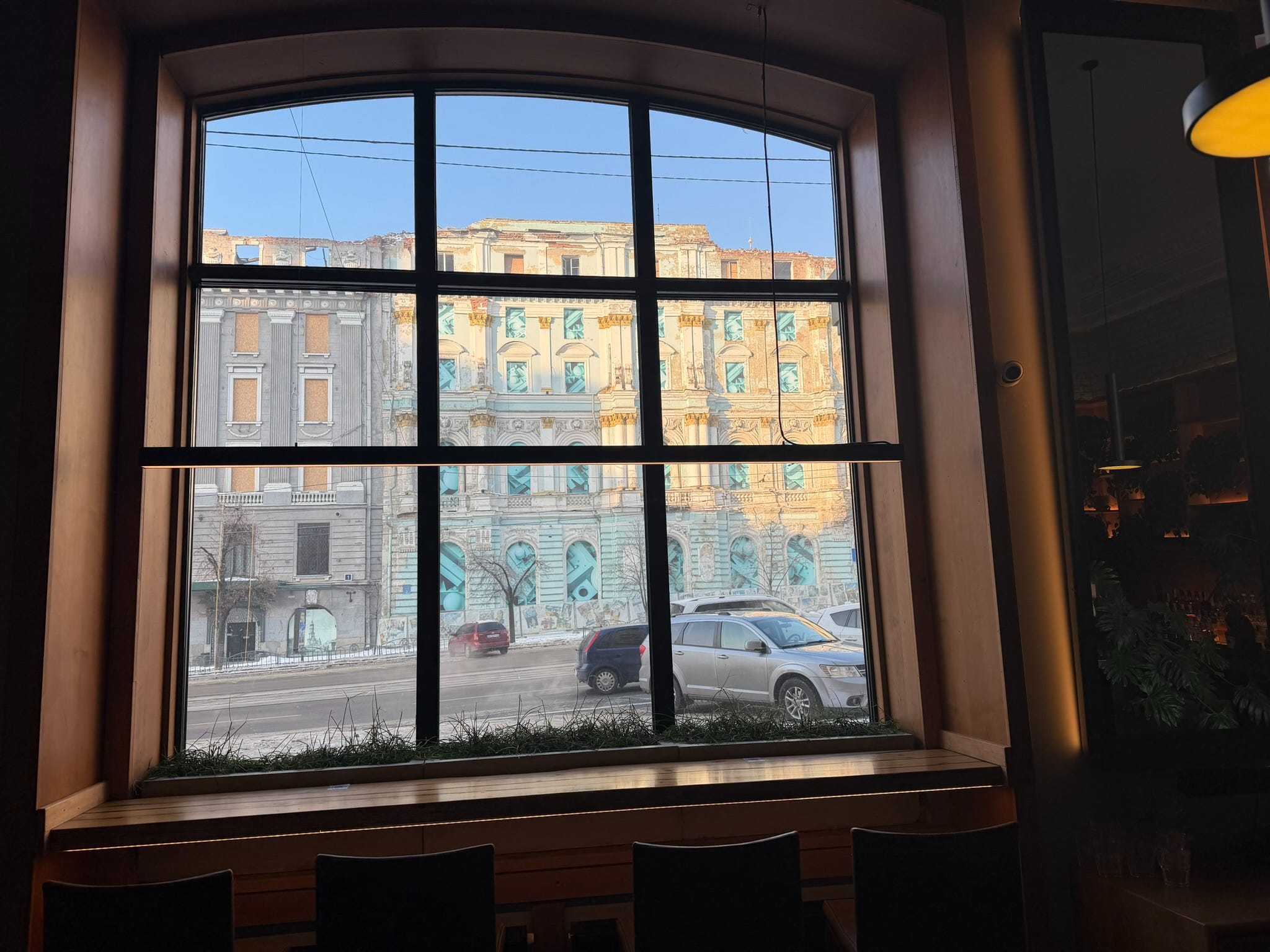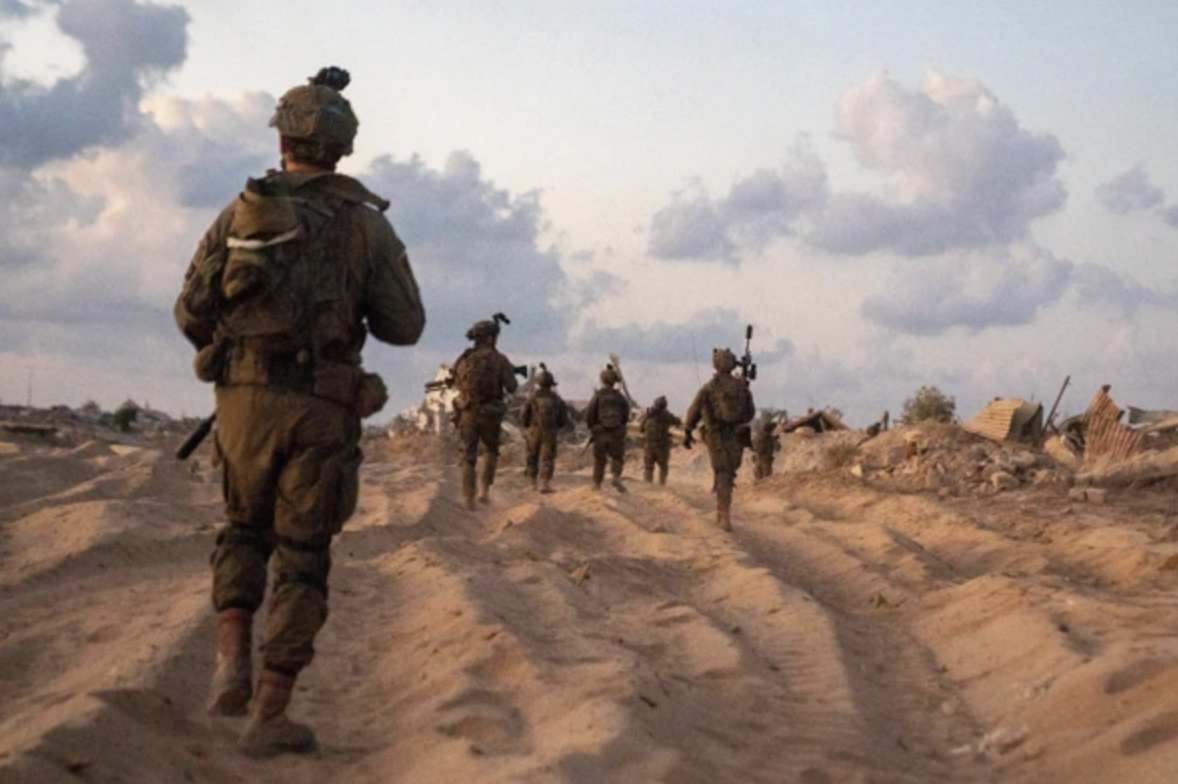Lawfare Daily: Ukrainian Lawmaker on Why Ukraine Must Export Its Weapons

Ukraine’s defense industry has grown substantially after Russia’s full-scale invasion. But it also suffered from a huge domestic burden—a ban on arms exports, which forced companies to close down or relocate abroad. Ukrainian lawmaker Halyna Yanchenko sits down with Lawfare Ukraine Fellow Anastasiia Lapatina to explain why exporting Ukrainian weapons will benefit Ukraine and global security.
To receive ad-free podcasts, become a Lawfare Material Supporter at www.patreon.com/lawfare. You can also support Lawfare by making a one-time donation at https://givebutter.com/
Click the button below to view a transcript of this podcast. Please note that the transcript was auto-generated and may contain errors.
Transcript
[Ask Us Anything Ad]
Anna Hickey: Every news alert in 2024 seemed to bring new questions, but fear not, because Lawfare has answers. It's time for our annual Ask Us Anything podcast, an opportunity for you to ask Lawfare this year's most burning questions. You can submit your question by leaving a voicemail at (202) 743-5831, or by sending a recording of yourself asking your question to askusanythinglawfare@gmail.com.
[Intro]
Halyna Yanchenko: Within this two and a half years, so, after the full scale invasion, the defense and security industry of Ukraine have expanded six folds. I believe that over such a short period of time, this is amazing.
Anastasiia Lapatina: It's the Lawfare Podcast. I'm Anastasiia Lapatina, Ukraine fellow at Lawfare, with Halina Yanchenko, a Ukrainian Member of Parliament who works in investment and the growing defense industry in Ukraine.
Halyna Yanchenko: I believe that it makes more logic. Just to lift the ban on export. To help industry to like, scale up, and decrease the cost per unit thanks to the scaling of the production.
Anastasiia Lapatina: Today we're talking about Ukraine's decision to ban the export of all domestically produced weapons and why, despite the military shortages, defense companies have been pressing to reverse that export decision as soon as possible.
[Main Podcast]
We're going to be talking about the issue of arms exports in Ukraine. It's a pretty hot topic in Ukraine now, especially among the people involved in the industry. But before we get into that directly, I just want to ask a general intro question. Can you just talk a bit about how has the Ukrainian domestic defense industry changed since Russia's full scale invasion in 2022?
Halyna Yanchenko: One thing to mention is that this was a huge full scale invasion, of a huge country, Russia, which as many people believed in the world, as the second largest army, and a lot of money that they make out of oil and gas. And they invaded into a country, which is relatively small, yes, smaller than them.
So for us there was only couple chances to survive in this full scale invasion and actually I believe that we were quite successful in that, and after almost three years we keep on fighting, and we even have some successes on the front line. How did we manage that?
I believe a couple things. One is kudos to Ukrainian society because only state or only army, as it was in the beginning of full scale invasion, was unable to actually to fight back the enemy, but because the whole society was very consolidated and people were helping each other, people were risking their lives, going to army voluntarily and stuff like that. Because of this huge unity of the society, we managed to fight back.
Lots of people, as I said, joined the army. Some people were helping other civilians to evacuate from occupation, from dangerous places where the fights were going on. Some people were bringing humanitarian assistance. Some people were trying to find some dual-use products like helmets or armored vests or stuff like that to help those who are joining army and stuff like that.
So this unit of society is one first component of our success, I would believe, and second component is actually defense and security sector, defense and security industry of Ukraine. And this is yet another wonder, I would say, to some extent. And currently, all defense and security innovations or majority of defense and security innovations in this world now, nowadays being created in Ukraine, the situation in Ukraine is quite unique, and very favorable, for this kind of innovation.
Well, first just to explain and give some context, because we were a smaller country, we had to have some advantages and our advantage was technologies. So we started to generate a lot of technologies. And once again, because of this unity of society and desire to help a lot of people who are working in other spheres, they switched into defense and security and they started to adopt their innovation, or there are some thoughts to the needs of the army. So like that's how a number of, variety of various drones were put together and suggested for army.
So we had to fight not only with people, but with technologists. And this is first, second, we had these people with motivation to actually produce this technology and come up with this technology. The third component of this success is communication in the society. People are eager to help each other. People easily create contact, like strangers are making contact and cooperate. If they understand that they are working on the same goal.
That's why majority of Ukrainian defense and security companies, they cooperate with some military units on the front line. They provide this military units, sometimes free of charge even with their products and military units on the front line, they can test these products, they can test innovative things, and provide a very quick feedback to the company. It makes the round of innovation, feedback, improvements, second testing and stuff like that super quick, and super cheap compared to what is like generally practiced in the world, including like established countries like Great Britain or U.S. or Germany or stuff like that. And that's what helps to speed up the innovations and make them with relatively like smaller resources compared to what what we usually have around the globe.
So, this is the background, why and how the military mil-tec, expanded largely. And now to give you some numbers within this two and a half years. So after the full scale invasion, the defense and security industry of Ukraine have expanded six folds. I believe that over such a short period of time, this is amazing dynamic, amazing development, and we see that it continues. and on my behalf as a Member of Parliament and also a person who is like in charge in many capacities, who is cooperating with various companies, and industries, and investors, both domestic and foreign. We are working also very hard to liberalize the legislation and rules and regulation framework to make sure that these innovations, these investments can be done quicker and the industry can expand even more.
Anastasiia Lapatina: As a Ukrainian, I can, of course agree to everything you've said. It is amazing how quickly the industry has grown and it is amazing how quickly people came together, especially in the early days of the full-scale invasion. And there are, correct me if I'm wrong, but there are around, I think 500 defense companies in Ukraine right now. And do you have an updated stat on that?
Halyna Yanchenko: Yes, officially those companies who claim themselves as, like, defense, like for defense, the official registry has 600, but I know of at least a thousand of them. Some companies are on their early age of development, stage of development, and some companies they prefer not to be marked as defense and security because of different reasons, sometimes because of security, sometimes because they don't like need this additional thing.
Anastasiia Lapatina: Okay. So around a third of that number, let's say 500, 600, around a third of them are private companies, there have been a conversation recently and some surveys and stats showing that pretty much the majority of these companies have at least considered actually relocating outside of Ukraine and leaving Ukraine and establishing offices, production lines, somewhere like Poland, or Estonia, Lithuania, somewhere around Ukraine.
So why is that happening? I think that's a great segue to lead into the meat of the conversation.
Halyna Yanchenko: Yeah, currently there are a lot of discussion about the, basically, I would say it's a political decision, to limit the export of weapon, and this kind of things out of Ukraine. This decision was made in the beginning of full-scale invasion because we need to actually understand what we have in Ukraine, what can be sent to the front line really quick. Of course, when we were, like, making this audit to some extent, it was important to make sure that these things won't be exported, if they are needed for army.
Now, I believe that we have an understanding, everything what is going on in Ukraine in mil-tec on one hand, on another hand, our mil-tec producers can actually produce much more various goods than Ukrainian state can purchase with the funds available. And currently, I should say, that's pretty much, like, majority of funds that we gather within the country. As taxes, like duties and stuff like that, we spent on war, on various articles, but like generally it's in the war. So, the resources are limited.
Anastasiia Lapatina: And there was a huge gap there, right? As far as I understand, Ukraine can spend, I think, roughly 6 billion on procuring these domestic weapons, but the capacity of the industry is like 30 billion. But Ukraine just can't, doesn't have the money to buy it.
Halyna Yanchenko: It’s up to 20. Yeah. And that's why, and that's why lately there is a discussion that the exports should be like, should be free, and companies who can produce more than the state can purchase should have an opportunity to export. I believe that we are very close to this like decision and to its implementation. So basically now a number of there is a state organization.
They received a task to actually like, develop the mechanism of this procedure, so to say, how we will make sure that the product is not needed to army or army is not planning to purchase this product and stuff like that, like some other issues, we want to make sure that weapon that is produced in Ukraine will not end up like somewhere where we don't want it to end up.
And there is already a general framework, how it should work. So I believe, and I really hope, that we are moving to, actually, to this decision that is very needed and very expected by this sector.
Anastasiia Lapatina: Let's unpack the, kind of, both sides of this debate, because I think it's very interesting.
One of the interesting things about it is if you don't really understand the economics of it, it sounds like a crazy thing, right? Like you're a country at war, you're constantly begging the U.S. and others for more weapons. Yet here you are asking the government to let you export the weapons. But so, like on an emotional level it's this, kind of, weird decision. Why would Ukraine do it?
But as we've mentioned, there is this really big gap between how much Ukraine can pay for the weapons and how much the companies can actually produce, and because the government can procure all of these things, the companies, some companies end up closing or just moving out of Ukraine to basically avoid this export restriction, and stay afloat and keep producing.
Halyna Yanchenko: If a company is producing something that the state is not able to purchase, then companies will stop producing.
Anastasiia Lapatina: Exactly.
Halyna Yanchenko: Because they can't produce weapon out of air. So they still need money to buy components and stuff like that. And that's why there should be opportunity to buy, to sell it.
Yeah, they can sell part to the government, as much as government or as much as army needs and can procure, but the rest, if they can if they can produce more, and some of the technologies or some of the products are quite interesting. And we receive a lot of requests from our allies, from Western allies, from European countries, that they're interested in this or that product. And if we can manufacture or produce more than the state will buy, then they will be actually very interested in having this product in their stores.
Anastasiia Lapatina: There was this survey that was published recently by Techforce, and, for an American audience, it's kind of like a union of dozens of American manufacturers. And they've surveyed the companies that are in their portfolio and 85 percent of the companies, I think, said that they've been approached by NATO members and countries in NATO about certain partnerships or about procuring the weapons, but they can't do any of that if they're located in Ukraine because of this ban on exports.
And that's very interesting because I think, there is an obvious like economical component to it, as we've mentioned, of course, like, you can't keep the company open if you don't have the money to produce, but also there is the part of like Ukraine needing to integrate with the West and be a part of this global weapons network, right? The global manufacturing.
How important you think that component is? It's like, if countries in Europe are procuring weapons from us, they're also more interested in defending us, right? Because they're dependent on some of these weapons.
Halyna Yanchenko: They are definitely more interested in cooperation, in long-lasting established cooperation.
But I would like to raise another side of this issue in general. In Ukraine, and actually abroad as well, when we were raising the issue of European integration, Euro-Atlantic integration and stuff like that, a lot of people in Ukraine and abroad, they were considering that, like, Ukrainian is a young partner, younger brother, yeah, and that's, or as a beggar, please give us something, please do something for us. It should not be like that anymore, because actually Ukraine has a lot of things that we can share with Europe or Euro-Atlantic community that we can teach, we can share and we, there are things where we can actually strengthen both European and Euro-Atlantic communities.
And by that I would mention a number of things, starting with the fantastic digitalization tools, like, tools that help Ukrainian state to interact with cities and business. We have state mobile application, where our citizens can receive majority of state services just with their cellphone, within five minutes.
Anastasiia Lapatina: It's great. Really it is.
Halyna Yanchenko: Oh, it’s great. It's convenient. It saves a lot of time, effort, and money for both citizens and state. And this is something that is absolutely unique and that we can share actually, yeah, like with Europe. So this is something that Europe can actually learn from Ukraine, or Ukraine, I guess, can share this technologies approaches and stuff like that to strengthen the whole European family.
Second for sure and I believe that everyone who's watching us will agree that Ukraine has probably the most experienced, and the strongest army in the whole Europe. And in many, Ukrainian Army has a very unique experience that is unique for the countries of NATO. So, yeah, so this is something like, well, we can actually strengthen NATO countries or NATO communities.
And third is mil-tech. Ukraine has a lot of to offer in mil-tech with all the innovations that are taking place, especially drones, especially radio electronic warfare and actually like many other types of technologies. Moreover, I should say that some of the technologies that are developed in Ukraine, they are much cheaper than the traditional equipment or a traditional weapons.
So it can actually help within the limited budgets that NATO countries are allocating. It can like help these countries to be prepared better and to have more devices to, to protect themselves. Because this is one of the challenges that we in Ukraine face when we have smaller resources than Russia. So we have to like find some ways, how to like,
Anastasiia Lapatina: Innovated, yeah.
Halyna Yanchenko: And see Russian missiles down with less expensive technologies and millions of Ukrainians are thinking about it and they are suggesting, like, various kind of, ideas. So that's what makes us stronger and this is something that we can definitely share and something that how we can actually strengthen our Western friends and Western community where we want to be a part of.
Anastasiia Lapatina: And this production can also only get cheaper and cheaper if Ukrainian producers have the ability to scale up, right?
Halyna Yanchenko: Of course.
Anastasiia Lapatina: So if within Ukraine, you can only produce a thousand drones. If then you can export and you have a bigger money flow, you can produce much more making per-unit costs cheaper, which would then also like benefit the Ukrainian government because they can buy more units with the same amount of money.
So like the economic side here makes sense, and even for someone with very limited economics knowledge, it makes a lot of sense. But what are the arguments against it though? Why we're in the third year of the war and the decision still hasn't been lifted? What are the arguments on the other side?
Halyna Yanchenko: I can only guess, and I have some ideas, but all of those ideas have little sense if people with economic education discuss them.And I would not like to actually like drop them down because once again, I believe that people with, who are educated, they understand that these arguments are nonsense and there is no sense to actually, you know, like, repeat them.
Anastasiia Lapatina: I mean, you mentioned one thing that the government might be scared that the weapons will end up in the wrong hands, that like Russia will end up procuring them, which Russia already sees how they operate on a daily basis, right?
Halyna Yanchenko: This is first and second thing, there is a very strict control over weapon and dual use products. So, like they can't, if you sell it, or if you pass it to a country, from country A to country B cannot pass it further to country C without the permission of country A.
Anastasiia Lapatina: Of country A, which is something that has happened with the, with Like for example, Storm Shadows, we couldn't use them because it was using American technology and the Americans had to, you know, give the go-ahead
Halyna Yanchenko: Yeah, give it permission to pass this missiles or this equipment to Ukraine. The same thing with Patriots. Yeah, those Patriots that we have in Ukraine, they were produced in U.S., but we did not receive them from U.S.. We received them from Germany. So Germany had to take a permission from U.S. to pass us free of charge, some of the Patriot system that they have.
Anastasiia Lapatina: So these would be similar laws if Ukraine opens up the export, it wouldn't just be like opening the gates.
Halyna Yanchenko: This is a global practice and a global regulation, I would even say. And that's why I'm saying that all the all of these like arguments that some people drop down, they have little sense for those who understand the system and understand the sphere.
Anastasiia Lapatina: Another question I had when researching this issue is, this gap that we talked about, how much Ukraine can actually procure and how much money it can pay to producers and the capability of producers, like, this roughly $20 to roughly $6 billion. Why can't Ukraine close that gap? Like, is it an issue of asking other states for more money and that's not going to happen? Or like, what are the ways in which Ukraine can get more money for this? Because this seems like the most important kind of investment to make, right?
Halyna Yanchenko: Absolutely. For over two years the money that we received from Western countries, we could not spend them on war. So anyone, but anything but war, there was a condition that came with those money no matter like what was the status of money, help, like financial assistance or loans or anything else.
So, we had very limited budget in Ukraine. We spent everything that we collect in Ukraine on war. Not only procurement of weapons, but also like salaries to our defenders or payments to their families if the defender has died or stuff like that. So all procurements, ammunition, anything that is related to war. That is why the general budget that we can spend on the war was very limited.
Anastasiia Lapatina: That's so interesting. Aren't the Danes changing that though? The whole Danish initiative.
Halyna Yanchenko: Yes, partly, very partly.
Anastasiia Lapatina: For context, Denmark has started this initiative of basically giving Ukraine financial aid specifically for the purpose of investing in domestic weapons production. And some other countries have joined as well.
Halyna Yanchenko: Yes. That was a great case because they started it. Yeah, so they basically, like, showed that, it's impossible that some countries can give funds or financial assistance directly to actually defense issues, defense purposes, or they can like, procure weapons that is produced in Ukraine, especially given the fact that majority of weapon which is produced in Ukraine is cheaper than the Western analogs.
Yeah. But majority of the countries, they were, especially if they are purchasing something not in their country, but like anywhere else in the world, why not to purchase it in Ukraine? So that was a great case in that relation after the Danes, I believe Norway also followed this this example.
And also there were some funds allocated by the European Union. But the last update, I believe that this is not, I don't have the latest data, but the last update that I received, it was about something like $620 million.
Anastasiia Lapatina: Yeah. So it's very small.
Halyna Yanchenko: So something, maybe 640, something like that was allocated to procure weapon, which is produced in Ukraine. So, but, this is only, as of the day, it's still only a small share because like we in Ukraine, like spent $6 billion on procurement and this is 600 million.
Anastasiia Lapatina: And the industry needs at least another roughly 15 billion. So it's a huge gap, yeah?
Halyna Yanchenko: Yeah. So I believe that it makes more logic just to, to lift the ban on export, to help the industry to like, scale up and decrease the cost per unit. Thanks to the scaling of the production.
Anastasiia Lapatina: Well, Helen, I hope your efforts pay off and it does happen. Thank you so much. This was a very interesting conversation.
Halyna Yanchenko: Thank you. Really appreciate it.
Anastasiia Lapatina: The Lawfare Podcast is produced in cooperation with the Brookings Institution. You can get ad-free versions of this and other Lawfare podcasts by becoming a Lawfare material supporter through our website, lawfaremedia.org/support. You'll also get access to special events and other content available only to our supporters.
Please rate and review us wherever you get your podcasts. Look out for our other podcasts including Rational Security, Chatter, Allies, and the Aftermath, our latest Lawfare Presents podcast series on the government's response to January 6th. Check out our written work at lawfaremedia.org. The podcast is edited by Jen Patja, and your audio engineer this episode was Cara Shillenn of Goat Rodeo. Our theme song is from Alibi Music. As always, thank you for listening.






.jpg?sfvrsn=407c2736_6)
